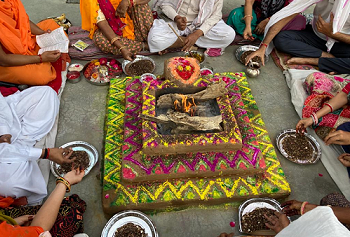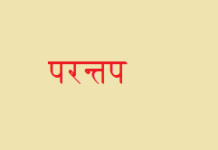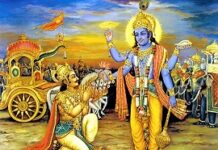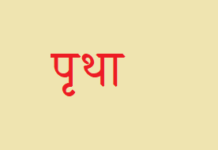These dialogue between Yudhishthira asked Markandeya is mentioned in Mahabharata Vana Parva – Markandeya-Samasya Parva – Chapter 143, where Yudhishthira asked rishi Markandeya about the consequences of the good or evil actions of an embodied being.
Dialogue between Yudhishthira and Rishi Markandeya
Yudhishthira asked Rishi Markandeya –
ऐहलौकिकमेवेह उताहो पारलौकिकम् ।
क्व च कर्माणि तिष्ठन्ति जन्तोः प्रेतस्य भार्गव !
Oh descendant of Bhrigu ! Do we reap the fruits of our acts in this world or in another world ? where do our actions remains after our death?”
Rishi Markandeya replied :
Prajapati Brahma was first to born and he created beings, bodies and created Scriptures so that they can know about the Dharma. During that time beings were as good as the gods themselves, could go to the heavens to meet Devatas whenever they want and can come down again and they live until they wanted and can take birth as they wished.
They use to live upto thousand years and they use to have thousands of children.
After some time they came into contact of desires and anger. they started practising falsehood and duplicity for subsistence and were overpowered by greed and ignorance. Because of these acts they started dying, even without there wish.
They were born among lower animals or driven to hell and again and again had to suffer the pain of rebirth in this wonderful world on account of their vicious deeds. Their life became short and wicked and they paid the penalty of their terrible deeds; were covetous of everything, became atheists and indifferent in mind.
Destiny of Ignorant men
अयमादिशरीरेण देवसृष्टेन मानवः ।
शुभानामशुभानां च कुरुते संचयं महत् ॥ ७६ ॥
आयुषोऽन्ते प्रहायेदं क्षीणप्रायं कलेवरम् ।
सम्भवत्येव युगपद् योनौ नास्त्यन्तराभवः ॥ ७७ ॥
Man Accumalte the good and bad deeds by the actions of his past life. When when his age is completed, he leave this current body and take birth in a new form. and he never remains disembodied even for a single moment.
तत्रास्य स्वकृतं कर्म छायेवानुगतं सदा ।
फलत्यथ सुखार्हो वा दुःखार्हो वाथ जायते ॥ ७८ ॥
कृतान्तविधिसंयुक्तः स जन्तुर्लक्षणैः शुभैः ।
अशुभैर्वा निरादानो लक्ष्यते ज्ञानदृष्टिभिः ॥ ७९ ॥
There in his new existence his (god and bad acts always follow him like his shadow and the consequences thereof make his existence either pleasurable or painful. The wise sees that every creature is chained to an unchangeable fate by the destroyer (Yama). He cannot get rid of the consequences of his acts.
Destiny of Wise men
किं चिद् दैवाद्धठात् किं चित् किं चिदेव स्वकर्मभिः ।
प्राप्नुवन्ति नरा राजन् मा तेऽस्त्वन्या विचारणा ॥ ८६ ॥
Wise attains the fruits of actions by destiny (प्रारब्धवश), some by practising Yoga and some by their own acts.
इह वैकस्य नामुत्र अमुत्रैकस्य नो इह ।
इह वामुत्र चैकस्य नामुत्रैकस्य नो इह ॥ ८८
Some men enjoy happiness in this world but not in the next; some attain it in the next world but not in this; while others neither in this world nor in that to come.
धनानि येषां विपुलानि सन्ति नित्यं रमन्ते सुविभूषिताङ् गाः ।
तेषामयं शत्रुवरघ्न लोको नासौ सदा देहसुखे रतानाम् ॥ ८९ ॥
They, that possess vast wealth, sport themselves every day richly adorning their persons (with ornaments and dresses). Such men, O destroyer of powerful enemies being addicted to physical enjoyment, attain to happiness in this world but not in the next.
ये योगयुक्तास्तपसि प्रसक्ताः स्वाध्यायशीला जरयन्ति देहान् ।
जितेन्द्रियाः प्राणिवधे निवृत्ता- स्तेषामसौ नायमरिघ्न लोकः ॥ ९० ॥
O slayer of foes, those who are absorbed in spiritual thoughts, devoted to asceticism, engaged in the study of the Vedas and who mortify their bodies, have a control over their passions and abstain from killing animals, enjoy happiness in the next world but not in this.
ये धर्ममेव प्रथमं चरन्ति धर्मेण लब्ध्वा च धनानि काले ।
दारानवाप्य क्रतुभिर्यजन्ते तेषामयं चैव परश्च लोकः ॥ ९१ ॥
Those that first lead a virtuous life and honestly acquire wealth in due time and then marry and perform sacrificial rites, attain happiness both in this world and in that to come.
ये नैव विद्यां न तपो न दानं न चापि मूढाः प्रजने यतन्ति ।
न चानुगच्छन्ति सुखानि भोगां- स्तेषामयं नैव परश्च लोकः ॥ ९२ ॥
And those stupid persons who have neither learning nor asceticism, nor charity and who do not multiply their kind and are not given to worldly joys attain to happiness neither in this world nor in the next.



















